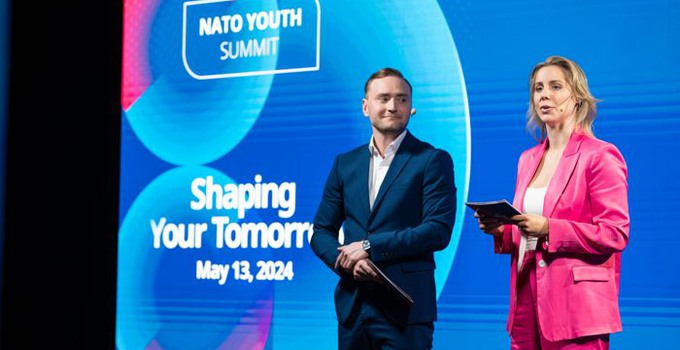
Carl Johan Skoog and Sarah Franzén, students at the Swedish Defence university, was Masters of Ceremony when the fourth edition of Nato Youth Summit was launched in Stockholm. Photo: Anders G Warne.
NATO top participated in NATO Youth Summit in Stockholm
On May 13, the fourth NATO Youth Summit was held simultaneously on both sides of the Atlantic - as well as in Brussels - where NATO Secretary General Jens Stoltenberg participated via video link and answered questions from students on site in both Miami and Stockholm.
The NATO Youth Summit delves into the most pressing global issues for young people today and is aimed at young people between the ages of 18 and 35. The Masters of Ceremony in Stockholm were the Swedish Defence University's students Sarah Franzén and Carl Johan Skoog, who began with a quick poll of "the most pressing challenge to global security today?" Of the ten or so response alternatives, "disinformation" sailed straight to the top with about a third of the votes, closely followed by "erosion of democracy" and "military action by Russia".
NATO Summit Challenge
The fact that disinformation is perceived as a major threat to global security became even clearer when three of the ten winners of the NATO Summit Challenge were presented on stage in Stockholm. The competition is an opportunity for young people to contribute with suggestions on how we can jointly build a secure future. First out of the three winners was Marie-Magdalena Bradova, a student at King's College London. She highlighted disinformation as one of the biggest threats to our societies and her competition entries aim to help and educate the younger generation to navigate and recognize disinformation online.
"My proposal is a mobile app where a NATO soldier in the form of an avatar guides the user through various games that aim to identify disinformation. The games will give young people tools to identify disinformation and at the same time learn more about NATO. The app should be available in all Member States and languages, she explained."
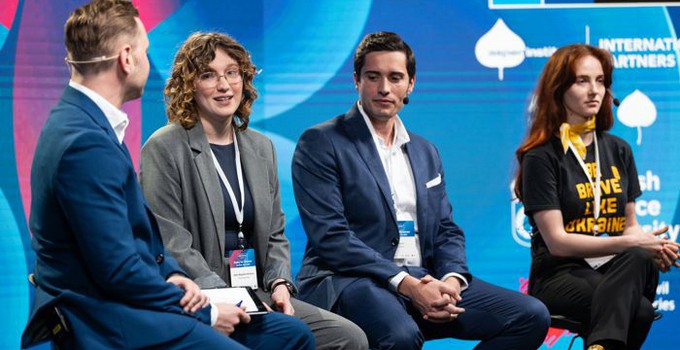
Carl Johan Skoog presents Marie-Magdalena Bradova, Dário Pedro and Yana Rudenko who were three of ten winners of the NATO Summit Challenge. Photo: Anders G Warne.
Dário Pedro from Portugal and the company Beyond Vision presented their proposal, which is a new defence system: "Dynamic Avoidance of Collision Systems". Last out of the three winners was Yana Rudenko, a student at Leiden University from Ukraine. She told of her greatest fear after the massacre in Bucha and the liberation that followed – namely that the world would believe in Russian disinformation.
"I started writing about the war myself and sharing my texts on LinkedIn because I don't trust the media to get accurate information: They may have been misinformed and don't see the true images of Russia's war of aggression up close."
Her winning contribution in the NATO Summit Challenge was the organization, ABBA, which she co-founded to collect young people's experiences and raise money to inform about Russia's war of aggression and educate young people to be able to contribute in different ways in both the civil and military defence in Ukraine.
Everyone can contribute to building resilient societies
If disinformation was at the top of the young participants' list of future threats, building the resilience of our societies was at least as high on the list of challenges for the older generation. Charlotte Petri Gornitzka, Director General of the Swedish Civil Contingencies Agency (MSB), gave the opening speech together with our own Vice-Chancellor Robert Egnell. She spoke about the importance of building a resilient and robust society, a stable total defence consisting of military defence and civil defence, and stated that we can all contribute to the work of making our societies more resilient.
"It starts at home with our families and friends, it continues at school and at our jobs, and further on in our spare time through volunteer work."
Robert Egnell particularly highlighted the challenges and increasingly complex threats that we are facing and mentioned in addition to Russia's invasion of Ukraine and China's actions in the Pacific, also more traditional security threats from cyber warfare and climate change to disinformation campaigns, extreme poverty and pandemics.
"There is no shortage of common challenges for the now 75-year-old defence alliance NATO," he stated.
He also said that he had just returned from NATO's 53rd "Conference of Commendants" where they talked about the difficulty of educating future leaders to be effective in the environment with complex threat scenarios that we see today.
"We realized that we need to help educate very flexible minds and critical thinkers who can reflect and constantly relearn and think new throughout their careers in order to adapt to a changing environment – but it's a challenge for us that we embrace."
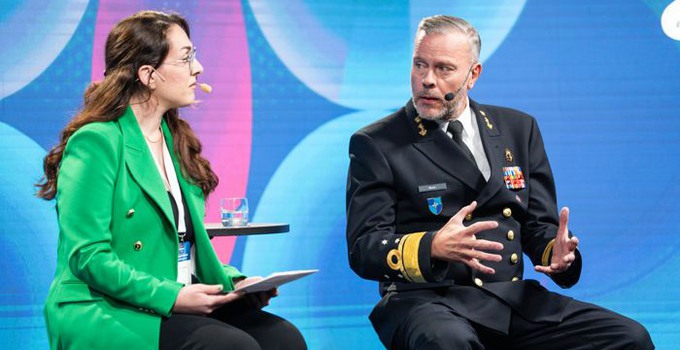
Admiral Rob Bauer, Chair of the NATO Military Committee with moderator Federica Mangiameli from GLOBSEC. Photo: Anders G Warne.
"We are more resilient than we think"
Admiral Rob Bauer, chairman of NATO's military committee, also wanted to talk about resilience. Moderator Federica Mangiameli from GLOBSEC urged him to speak directly to all young people within NATO: "You are at the NATO Youth Summit and have the chance to speak directly to us – what can we all do in our daily lives that increases our resilience?"
"I think that the young generation – who are also here today – are more resilient than they think. For example, the Covid pandemic hit the younger generation hard, whose everyday lives were hugely affected when they tried to study, play or go to festivals – in short, everything that young people enjoy doing. But they managed to handle it and are now ready for the next one."
He also drew a parallel to Russia's invasion of Ukraine and war in Europe that for many seemed very distant just a few years ago.
"Now it is clear that the war is back in Europe and that our societies must become more resilient. We look at Ukraine today and Yana Rubenko, who I just listened to, gave good examples of how we can all help each other."
Resilience is of course not just about war, it can be a natural disaster or some other form of crisis, Admiral Bauer continued. But it is important to be prepared.
"Industry also needs to prepare, it's about energy issues, natural resources and access to food – everything can be used against us as a weapon. Those who thought that business contracts between companies and industries in different nations would ensure that we would avoid war in the future were wrong. We see the same risks with our dependence on China," he continued.
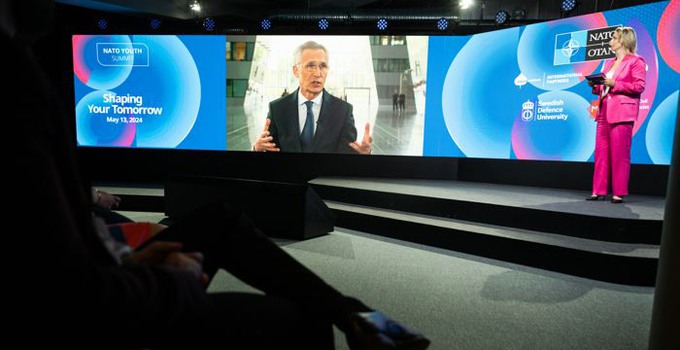
NATO Secretary General Jens Stoltenberg participated live from Brussels. Photo: Anders G Warne.
Question and answer session with NATO Secretary General live from Brussels
When the clock struck 3 p.m. Swedish time, the NATO Youth Summit also started in Miami. At that time, the conference was broadcast together for a while from three different studios - in Miami, Stockholm and Brussels. In Brussels, NATO Secretary General Jens Stoltenberg participated and urged all member states to continue to invest in defence, as no one knows what will threaten us in the future.
"We should remember that in NATO, we have just over half of the world's defence force on our side and likewise half of the world's economic assets. Still, it is difficult to free up money to increase defence spending in most of the alliance's member states, but it is important that we do not relax now."
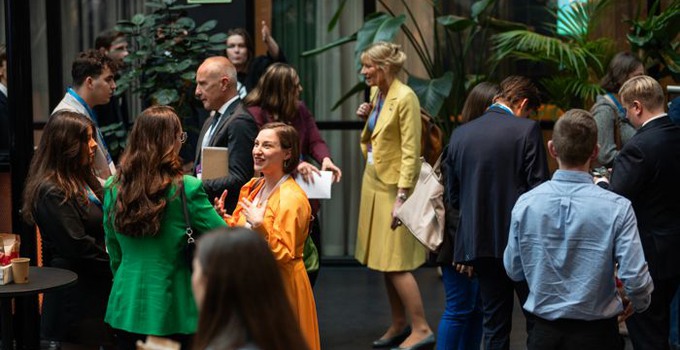
Mingling and networking on the terrace afterwards. Photo: Anders G Warne.
This year's event was the result of a unique collaboration between NATO, The Aspen Institute, the Swedish Defence University and the Swedish Civil Contingencies Agency (MSB).
Monika Wallström
Page information
- Published:
- 2024-05-14
- Last updated:
- 2024-05-14
